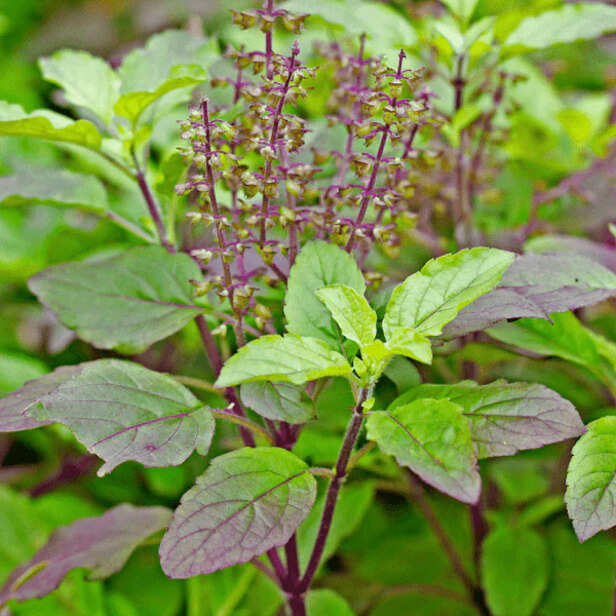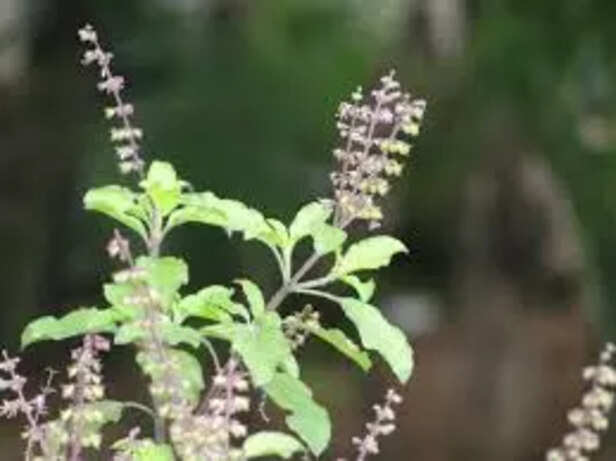Ever Wondered Why Tulsi is Worshipped in India? The Answer Will Surprise You
Nikita Kanyal | Jan 24, 2025, 22:44 IST
( Image credit : Timeslife )
Why is the tulsi plant revered in India? From its divine origins as the incarnation of Goddess Lakshmi to its remarkable health and environmental advantages, tulsi transcends being merely a plant it serves as a healer, purifier, and spiritual symbol. Uncover the mysteries surrounding this holy herb and understand why it endures through time.
Picture entering an Indian house and discovering a small green plant positioned prominently in the courtyard or on a windowsill, decorated with a little diya (oil lamp) or red thread. That’s tulsi, or Holy Basil it's not merely a plant, but a cherished part of the family. Have you ever considered why this modest plant receives such affection and respect?
The Divine Connection:
Tulsi’s story is deeply rooted in Indian mythology. Legend has it that tulsi isn’t just a plant; it’s the earthly form of Goddess Lakshmi, the deity of wealth and prosperity. And that’s not everything. Tulsi is also significantly associated with Lord Vishnu, one of the most venerated deities in Hinduism. It is believed that keeping a tulsi plant in the house brings tranquility, balance, and divine favor.
There’s even a celebration devoted to tulsi, Tulsi Vivah, during which the plant is ritually wed to Lord Vishnu. It’s not merely a delightful custom; it signifies the commencement of the Indian wedding season and represents the connection between earth and divinity. It’s no surprise that tulsi is so valued; it serves as a link between humanity and the divine.
Tulsi’s Healing Touch: Health Benefits You Can’t Ignore

But tulsi isn’t just about spirituality, it’s also a powerhouse of health benefits. In Ayurveda, it’s called the "Queen of Herbs," and for good reason. If you’ve ever been handed a cup of tulsi tea when you had a cold, you’ve experienced its magic firsthand.
Immune Booster: Tulsi leaves are packed with antioxidants and nutrients that strengthen your immune system.
Stress Buster: Feeling overwhelmed? Tulsi helps your body handle stress by calming your mind and balancing cortisol levels.
Respiratory Support: From a stubborn cough to seasonal allergies, tulsi’s anti-inflammatory properties work wonders.
Natural Detox: Sip on some tulsi tea to flush out toxins and feel rejuvenated.
Heart Health: It’s even been found to reduce cholesterol and regulate blood pressure, keeping your heart happy.
By worshipping tulsi, families naturally incorporate these benefits into their daily lives whether it’s chewing a leaf, brewing tea, or just breathing the air around it.
Here’s something you might not know: tulsi isn’t just good for you; it’s good for the planet. This little plant is like nature’s air purifier. Unlike most plants that release oxygen only during the day, tulsi does so 24/7. It additionally takes in harmful pollutants, providing a natural method to enhance air quality in your vicinity.
In a time when urban areas are suffocated by pollution, possessing a tulsi plant is not merely a cultural practice it is an environmentally friendly option. Consider how much purer our surroundings might become if each household cultivated its own tulsi plant!
For numerous Indians, the practice of venerating tulsi transcends mere religious custom. It serves as a time for reflection. Nurturing the plant, illuminating a diya, and saying prayers establish a soothing habit that links you to nature and nurtures thankfulness.
In the modern, hurried environment, where we are perpetually attached to devices, these tiny instances can anchor us. Caring for a tulsi plant acts as a prompt to decelerate and value life's uncomplicated pleasures.

Even as the planet changes, tulsi has succeeded in remaining significant. It’s not merely a herb that your grandmother endorsed; it’s a worldwide wellness phenomenon now. You can discover tulsi in herbal infusions, skincare items, and even nutritional supplements. Researchers have supported its advantages, and it’s earning acknowledgment well past Indian frontiers.
However, for us Indians, tulsi represents more than just a fashionable herb. It’s an emblem of our heritage, a guardian of customs, and a soft reminder of the knowledge of our forebears.
So, the next time you stroll by a tulsi plant, pause for a moment to genuinely observe it. It’s more than merely a plant; it’s a healer, a cleanser, a representation of dedication, and a champion for the environment. Tulsi serves as an excellent illustration of how something so basic can carry such significant meaning.
Revering tulsi isn’t merely a matter of belief, it’s about adopting a lifestyle that appreciates health, balance, and a profound relationship with nature.
The Divine Connection: Tulsi in Indian Mythology
There’s even a celebration devoted to tulsi, Tulsi Vivah, during which the plant is ritually wed to Lord Vishnu. It’s not merely a delightful custom; it signifies the commencement of the Indian wedding season and represents the connection between earth and divinity. It’s no surprise that tulsi is so valued; it serves as a link between humanity and the divine.
Tulsi’s Healing Touch: Health Benefits You Can’t Ignore

Image Source : Pixabay
( Image credit : Timeslife )
But tulsi isn’t just about spirituality, it’s also a powerhouse of health benefits. In Ayurveda, it’s called the "Queen of Herbs," and for good reason. If you’ve ever been handed a cup of tulsi tea when you had a cold, you’ve experienced its magic firsthand.
Immune Booster: Tulsi leaves are packed with antioxidants and nutrients that strengthen your immune system.
Stress Buster: Feeling overwhelmed? Tulsi helps your body handle stress by calming your mind and balancing cortisol levels.
Respiratory Support: From a stubborn cough to seasonal allergies, tulsi’s anti-inflammatory properties work wonders.
Natural Detox: Sip on some tulsi tea to flush out toxins and feel rejuvenated.
Heart Health: It’s even been found to reduce cholesterol and regulate blood pressure, keeping your heart happy.
By worshipping tulsi, families naturally incorporate these benefits into their daily lives whether it’s chewing a leaf, brewing tea, or just breathing the air around it.
A Green Protector: Tulsi and the Environment
In a time when urban areas are suffocated by pollution, possessing a tulsi plant is not merely a cultural practice it is an environmentally friendly option. Consider how much purer our surroundings might become if each household cultivated its own tulsi plant!
Daily Rituals: Finding Mindfulness with Tulsi
In the modern, hurried environment, where we are perpetually attached to devices, these tiny instances can anchor us. Caring for a tulsi plant acts as a prompt to decelerate and value life's uncomplicated pleasures.
Why Tulsi Still Matters in the Modern World

Image Source : Pixabay
( Image credit : Timeslife )
Even as the planet changes, tulsi has succeeded in remaining significant. It’s not merely a herb that your grandmother endorsed; it’s a worldwide wellness phenomenon now. You can discover tulsi in herbal infusions, skincare items, and even nutritional supplements. Researchers have supported its advantages, and it’s earning acknowledgment well past Indian frontiers.
However, for us Indians, tulsi represents more than just a fashionable herb. It’s an emblem of our heritage, a guardian of customs, and a soft reminder of the knowledge of our forebears.
A Plant That’s Part of the Family
Revering tulsi isn’t merely a matter of belief, it’s about adopting a lifestyle that appreciates health, balance, and a profound relationship with nature.
